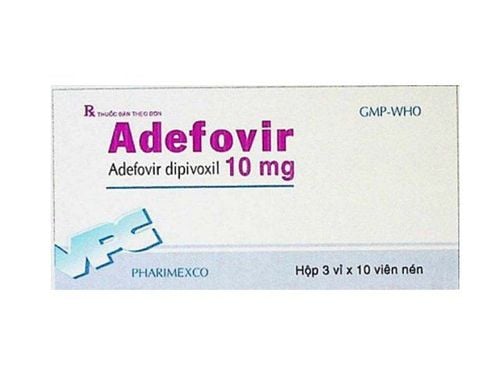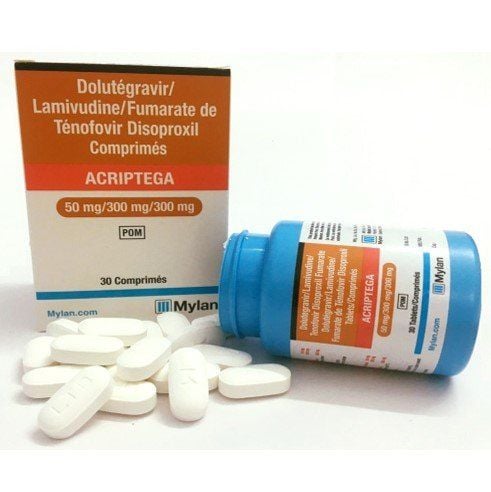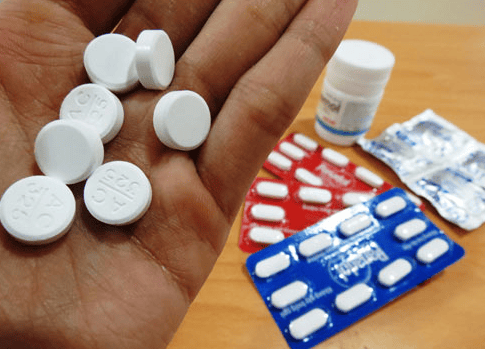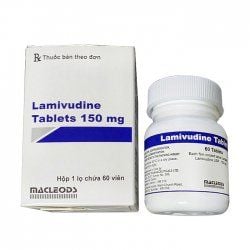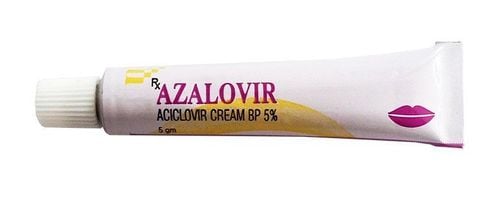This is an automatically translated article.
Amperison 0.5mg is indicated for use mainly to treat hepatitis B virus infection in adults and children over 16 years old. Before and during treatment with Amperison, patients need to consult their doctor's instructions and strictly follow the recommended dose to achieve the best effect.
1. What is Amperison?
Amperison belongs to the group of anti-bacterial, antifungal, antiviral and anti-parasitic drugs. Amperison 0.5 is prepared in the form of film-coated tablets, packed in boxes of 03 blisters or 10 blisters x 10 tablets. Each Amperison tablet contains the main ingredient, Entecavir (0.5mg content) and other excipients just enough. The active ingredient Entecavir in Amperison is an antiviral drug that belongs to the group of Nucleoside analogues. This drug has the potential to treat chronic liver damage caused by hepatitis B virus (HBV) in both adults and children. The mechanism of action of Entecavir is to slow down and inhibit the growth of the virus, and at the same time significantly reduce the amount of hepatitis B virus in the patient's body. However, the active ingredient Entecavir is only able to prevent the virus from attacking the liver, but it does not work to cure the disease as well as prevent the spread of this strain of bacteria to others.
2. Indications and contraindications to the use of Amperison 0.5mg
2.1 Indications for use of Amperison 0.5mg Amperison 0.5mg is usually prescribed by doctors for the following cases:
Treatment of chronic hepatitis B virus infection in children over 16 years old and Adults. Treatment of drug-resistant hepatitis B virus or chronic hepatitis B. There are limited data on the use of Amperison in patients co-infected with HIV and HBV. 2.2 Contraindications to the use of Amperison 0.5mg Do not use Amperison 0.5 for the following subjects:
Patients with a history of allergy or hypersensitivity to the active ingredient Entecavir or any other active ingredients in the drug . Amperison is contraindicated for pregnant women, who are in the period of breastfeeding. Amperison should not be used in children under 16 years of age.
3. Dosage and how to use Amperison
3.1 Dosage of the drug Amperison 0.5mg Dose for adolescents over 16 years old and adults with chronic hepatitis B who have not been treated with Nucleoside: Take 0.5mg / time / day (equivalent to 1 tablet). Dose for adolescents over 16 years of age and adults with a history of hepatitis B while using Lamivudin / with Lamivudin resistance mutations: Take 1mg / time / day (equivalent to 2 tablets). Dosage for patients with hepatic impairment: No dose adjustment of Amperison is required. Dosage for patients with renal impairment:
| Độ thanh thải creatinin | Liều thường dùng | Đề kháng thuốc Lamivudin |
| ≥ 50m l/ phút | Uống 0,5mg / lần / ngày | Uống 1mg / lần / ngày |
| 30 – dưới 50ml / phút | Uống 0,25mg / lần / ngày | Uống 0,5mg / lần / ngày |
| 10 – dưới 30ml / phút | Uống 0,15mg / lần / ngày | Uống 0,3mg / lần / ngày |
| Dưới 10ml / phút | Uống 0,05mg / lần / ngày | Uống 0,1mg / lần / ngày |
3.2 Instructions for proper use of Amperison 0.5mg Amperison is made in the form of tablets, so it will be taken orally with a large glass of water. The best time to take Amperison 0.5mg is on an empty stomach, specifically at least 2 hours after eating or 2 hours before the next meal).
In the process of taking the drug, the patient needs to apply the exact dose of Amperison indicated on the package, doctor's instructions or printed on the drug leaflet. Patients absolutely must not arbitrarily calculate, use or change the dose of Amperison 0.5mg without indication.
4. Some side effects of Amperison 0.5mg
According to clinical trial results, about 3% or more of patients reported experiencing adverse events such as headache, nausea, dizziness, fatigue, diarrhea, vomiting , indigestion, drowsiness or insomnia. Here are the symptoms from common to rare when using Amperison 0.5mg:
Common side effects (ADR > 1/100): Increased creatinine (about 2%), hematuria (9). %), urinary glucose (4%), headache, insomnia, dizziness, dyspepsia, nausea, diarrhea, vomiting, increased transaminases (more than 10%), increased amylase (approximately 3%), increased lipase (approximately 3%). 7%), increased bilirubin (about 3%) or fatigue (systemic effects). Uncommon side effects (1/1000 < ADR < 1/100): Abdominal bloating, indigestion, hair loss or rash. Rare side effects (ADR < 1/1000): Anaphylaxis, lactic acidosis, hepatic decompensation, serious medical illness, laboratory abnormalities (ALT elevation >5 times ULN high, elevation of lipase at least 2.1 times ULN, hematuria/glucose, hyperbilirubinemia >2 times ULN, elevation of fasting blood glucose > 250mg/dL, increase in creatinine by at least 0.5mg/dL. Side effects of Amperison 0.5mg are usually mild and go away on their own without any treatment.After stopping anti-hepatitis B antiviral therapy, including Amperison can lead to a severe hepatitis episode. The most obvious manifestation of severe hepatitis is a spike in ALT to 10 times the ULN and 2 times the serum concentration compared to baseline.
5. Things to note when using Amperison 0.5mg
5.1 What precautions should be taken while taking Amperison? Here are the things that patients need to be cautious about during hepatitis B treatment with Amperison 0.5mg:
Fatty liver disease and serious lactic acidosis are at risk of occurring when patients use substances similar to nucleosides alone or in combination with some antiretroviral drugs. Patients with decompensated cirrhosis should be cautious when treated with Amperison, because of the potential for many side effects, increasing the risk of lactic acidosis. Amperison should be used with caution in patients with chronic HBV infection and undetected HIV because this may potentially lead to the development of HIV strains resistant to Nucleoside reverse transcriptase inhibitors (NRTIs). Therefore, before starting treatment with Amperison, the patient should be tested for HIV. Obese patients, women, and people on long-term NRTI therapy should also use caution when taking Amperison. People who are at high risk of liver disease but have lactic acidosis or fatty liver should be cautious when using Amperison. Liver transplant recipients, if using Amperison 0.5mg, need to closely monitor kidney function during treatment. Amperison medicine can cause fatigue, dizziness and drowsiness, so people who often drive or use machines need to be careful when taking it. There have not been any studies on the effects of Amperison in pregnant women. Ideally, this drug should be taken by pregnant women only when absolutely necessary and after careful consideration of the benefits and risks. There are no specific data on whether Amperison is excreted in human milk, so nursing mothers should consult with their doctor before taking this medicine. 5.2 Interactions of Amperison 0.5mg with other drugs When combining Amperison with some other drugs, it may lead to an interaction reaction, adversely affecting the effectiveness of the drug:
Increase the effect and function of the drug. dose of Entecavir when co-administered with drugs such as Ribavirin, Valganciclovir or Ganciclovir. Amperison has the potential to interact pharmacokinetics with certain drugs that decrease renal function or compete with Entecavir for active tubular secretion. The serum concentration of the active ingredient Entecavir or the combination drug may then increase. May interact with immunosuppressive drugs, such as Tacrolimus or Cyclosporine. Liver transplant recipients taking Tacrolimus, Cyclosporine should be closely monitored for renal function before and after treatment with Amperison because the drug may affect renal organ function. Above is the important information about the drug Amperison 0.5mg. The correct use of the dose, how to take it, and how to store it will help the use of the drug to bring better results.
Please dial HOTLINE for more information or register for an appointment HERE. Download MyVinmec app to make appointments faster and to manage your bookings easily.




